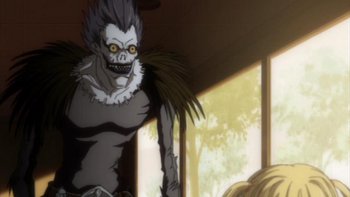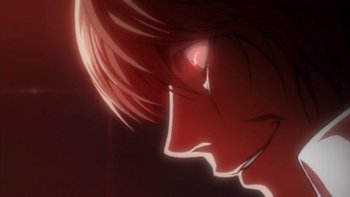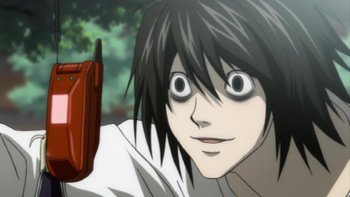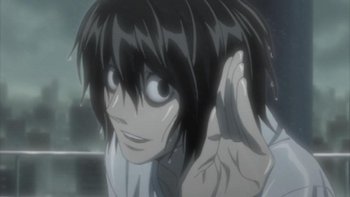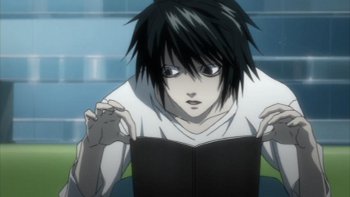I’ve been woefully neglectful of Anime over the past few years, having watched just a few isolated movies here and there. The time commitment for series, especially long series, tended to make me shy away from Anime for a while. However, I’ve been watching more television series lately, and when I heard Don and Mike talking about the first few episodes of Death Note over on the Radio Free Echo Rift podcast, I knew this was something I wanted to check out. There are some things about the series that are really engaging and interesting, though I think it did ultimately run out of steam towards the end.
The story begins in the realm of the shinigami, a race of supernatural beings that survives by killing humans to extend their own lives. This sort of existence is apparently not all the exciting, though, so one of the shinigami, named Ryuk, decides to make some entertainment by sending an extra “Death Note” (the device shinigami use to kill humans) to the human world, just to see what happens. Enter Light Yagami, a very intelligent young man who is well on his way to becoming a police detective. He is motivated by the seeming lack of ability among the world’s formal justice systems. When Light discovers the Death Note (and verifies that it actually works), he develops a plan to kill all the criminals in the world, thereby creating a utopia in which he is considered a god. However, when Light sets his plan in motion, various police organizations begin to notice patterns in the mysterious deaths, eventually attributing the deaths to a murderer they call Kira. The police hire the most famous detective in the world, a mysterious man known only as “L”, to hunt down Kira. L is able to immediately deduce the general location of Light/Kira as well as the operation of the Death Note (even though he doesn’t know how Kira is killing the criminals, he can deduce how it operates), and thus begins a battle of wits that will drive most of the series.
At this point, I should mention the rules of how the Death Note works. The Death Note is a simple notebook, and on it are listed 5 rules:
- The human whose name is written in this notebook shall die.
- This notebook will not take effect unless the writer has the subject’s face in their mind when writing his/her name. Therefore, people sharing the same name will not be affected.
- If the cause of death is written within 40 seconds of writing the person’s name, it will happen.
- If the cause of death is not specified, the person will simply die of a heart attack.
- After writing the cause of death, the details of the death should be written in the next 6 minutes and 40 seconds.
There are a lot of other rules that are revealed as the series progresses. Light spends a fair amount of time towards the beginning of the series experimenting with the Death Note, discovering that, for instance, a piece of paper that is removed from the death note will still retain its murderous capabilities.
The rules actually represent what is best about this series. From a relatively simple set of rules, the writers manage to wring out amazing amounts of suspense and plot. They really put the rules through the paces, and the series is actually very entertaining as a result. I’m reminded of Isaac Asimov’s robot stories, in which he devised three simple rules, then went about subverting them in several novels. Similar feats are abound here, and the series also does a good job of escalating the stakes or even just evolving the stakes so that the series takes on a different tone. There were two or three times when I thought the writers had cornered themselves, but actually came up with some sort of ingenious plan to evolve the series into something slightly different.
Spoilers aho, fun ahoy! I’ll try to keep them to a minimum, but it’s hard to write about the series without mentioning some broad, high-level spoilers.
For example, at one point, it becomes clear that there’s actually a second Death Note and what’s more, the Kira who is using that death note apparently doesn’t need to know someone’s name. This changes the whole dynamic of the series for a few episodes, and just when you think the series is about to wear out its welcome, it switches gears again, reversing sympathies back to Light.
Speaking of which, one of the difficulties I have with the series is that it’s generally told from the perspective of Light Yagami, who seems like a well intentioned sorta guy, but is ultimately the villain of the piece. As the series progresses and you see the lengths which Light is willing to go to protect his selfish vision of the future, he becomes less and less sympathetic. He kills literally thousands of people in the series, sometimes even innocent characters, people you grow to really like. I was intrigued enough by the pyrotechnics of subverting a powerful rule set that this wasn’t a huge problem, and you might be able to guess the way the series ends, given that Light is actually a pretty evil guy…
His counterpart, in the form of “L”, initially seems like the antagonist, but as you lose sympathy for Light, you start to see L as the true protagonist of the series. At the beginning of the series, L is basically represented by a disembodied voice, but eventually you get to meet him, and it turns out that he is also a young man. He’s delightfully eccentric and goofy, always snacking on sweets, holding objects from the top, and giving goofy smiles, all while representing a worthy foil for Light/Kira’s villainy. He’s a fun character, one of the more interesting detective characters out there, and definitely the strongest character of the series.
Clocking in at 37 episodes, this may be the longest single series I’ve ever watched. Unlike a lot of longer series I’ve watched, there really isn’t a ton of filler material here, though I guess a lot of that is a matter of interpretation. You could argue that the entire series is nothing but filler, an exploration of what kinds of tension you can extract from a simple rule set. Indeed, the throughline of the series is really driven more by the exploration of the rules than anything else. There’s a sort of duel of wits between Light/Kira and L, but that is really just fertile ground for more rule exploration. Ditto for the sudden shifts in narrative, which are executed well, to be sure, but which are really just ways of enabling the writers to play around with more rules.
I’m actually impressed with how well they were able to craft the series. Something built around a limited set of rules can’t last forever, and they really are able to wring a lot of juice out of that setup. The series really only starts to stumble when you get to the last 5 or 6 episodes. They just struck me as one shift too many. That last run starts with a really shocking event, something that saddened me greatly, but which I thought could have been a worthy plot development. Instead, the series just introduced some new characters and jumped ahead a few years. It gives the end of the series a sorta tacked-on feeling. It all works well enough, but by that point, the machinations of the plot were getting a little tired. It just started to seem a little arbitrary towards the end, as if the writers didn’t really care about character so much as they wanted to make the plot as byzantine as possible. Don’t get me wrong, I’m a big fan of byzantine plotlines, and I think that’s a big part of why the beginning of the series worked so well, but I think they just tried to stretch a bit too much towards the end…
So what we’re left with is a very good series. Compelling, exciting, and interesting, but perhaps a bit on the arbitrary side of things. I really love the exploration of rules and the way the writers were able to extract so much interesting television out of them, but it starts to feel a bit hollow towards the end of the series. There is, perhaps, a reason for that that is more personal than not, but I will say that none of my complaints ruined the series for me or anything. I actually did find this to be one of the most interesting Anime series I’ve seen, and would recommend it to people who like this sort of focus on plot machinations. I just wish I could have been a little more satisfied with that ending…
